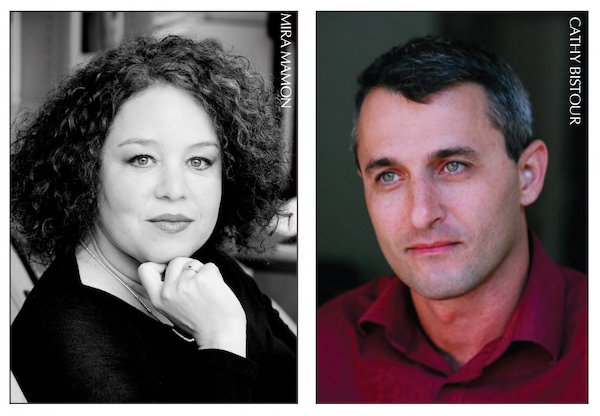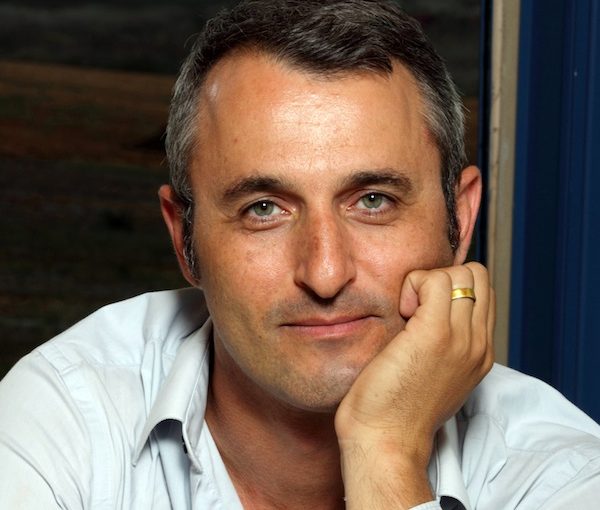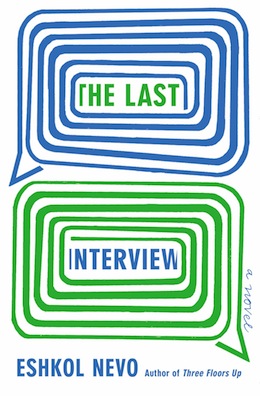Maya Arad and Eshkol Nevo are featured in the JCC Jewish Book Festival prologue event Jan. 19.
The JCC Jewish Book Festival begins its 40th year with a discussion that’s sure to be as intriguing as it is relevant. The two Israeli writers featured in the festival prologue event Jan. 19 – Maya Arad and Eshkol Nevo – are keen observers and talented communicators, even as their characters are not.
Boundaries, generational differences, family, love, work, politics, social mores, and other themes run through both Arad’s (New Vessel Press, 2024) and Nevo’s Inside Information (Other Press, 2023). Each book comprises three novellas, though Nevo’s very loosely connects all the narratives, so dubs itself a novel, despite the stories being almost completely unrelated. Melancholic would best describe the mood of both works.
While the English version of Arad’s The Hebrew Teacher was published just this year – translated by Jessica Cohen – the Hebrew version came out in 2018. Its stories retain their immediacy, and readers will be able to relate to some aspect(s) of every one.
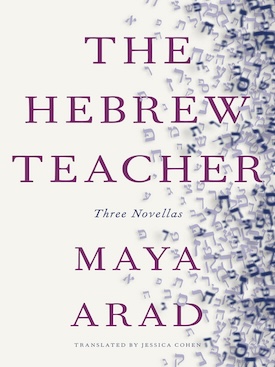 The title story, “The Hebrew Teacher,” is brilliant. When Ilana arrived in the United States from Israel in 1971 and started teaching, her Hebrew classes, both children and adult, at her synagogue and at the university, were packed: “Parents wanted their children to be able to chat in Hebrew, not just recite the prayers…. Everyone wanted to know a little Hebrew before they visited Israel. They wanted to learn the new songs.” Of course, those songs are far from new at this point in Ilana’s career, yet she still holds them and their visions of Israel dear.
The title story, “The Hebrew Teacher,” is brilliant. When Ilana arrived in the United States from Israel in 1971 and started teaching, her Hebrew classes, both children and adult, at her synagogue and at the university, were packed: “Parents wanted their children to be able to chat in Hebrew, not just recite the prayers…. Everyone wanted to know a little Hebrew before they visited Israel. They wanted to learn the new songs.” Of course, those songs are far from new at this point in Ilana’s career, yet she still holds them and their visions of Israel dear.
But enrolment in the Hebrew-language university courses has been dropping for almost two decades, both because “Israel was a tough sell these days. It wasn’t the fledgling little country of 45 years ago. Nor was Ilana the same beaming young woman who’d arrived, thick copper braid over one shoulder, to regale the riveted students with stories about hiking from the Mediterranean to the Sea of Galilee, working on a kibbutz, and firing an Uzi when she served in the Israel Defence Forces.”
Into Ilana’s tenuous professional world – her husband has just retired from the university and other key allies have moved on – comes a new hire, Yoad Bergman-Harari, who’d been born Yoad Harari but had “added on his father’s original name, Bergman.” When Ilana asks why, he responds, “‘To negate the negation of the diaspora’ … as though it were the most obvious thing in the world.”
The differences in their worldviews – particularly on the Israeli-Palestinian conflict – and approach to collegiality are stark. While Ilana has taught at the university for decades, she holds none of the cards here, as Yoad is the latest newfangled intellectual thing, and a professor, so can pretty much write his own ticket, and does.
In “A Visit (Scenes),” Miriam comes to the States for a three-week visit with her only child, Yoram, his wife Maya and their son Yonatan. Miriam makes the journey because her son rarely returns to Israel and she has yet to meet her grandson in person. In a string of short snippets, mostly from Miriam’s perspective but also from Yoram’s and Maya’s, we are privy to what everyone is feeling – which boils down to a lot of unhappiness. The lack of honest, open communication contributes to the tensions and dissatisfactions, which build as the visit goes on.
The final story, “Make New Friends,” is kind of mystifying at first, as we watch Efrat, an educated, successful woman with a good husband, start to spiral as she tries to protect their unpopular teenaged daughter from being hurt by so-called friends. She gets way too involved, even entering the teen social media universe, and it’s only when Efrat realizes that she herself doesn’t belong to any group or have any real friends that she begins to understand her reactions (and actions) to her daughter’s situation.
One review of The Hebrew Teacher comments that Arad, in these novellas, “probes the demise of idealism and the generation gap that her heroines must confront.” This is an apt description. And it could be said that Nevo also explores the demise of idealism in Inside Information, which was translated from Hebrew into English by Sondra Silverston.
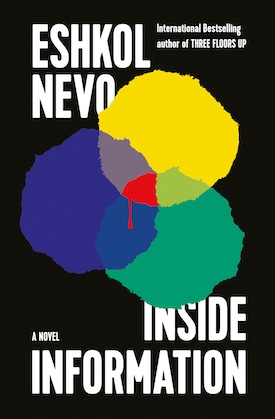 The first two stories of the novel have similar plotlines – men who are led by their sexual desires to act in illegal or inappropriate ways. The main difference between the protagonists is that the “hero” in “Death Road,” Omri, goes mostly willingly towards his potential downfall while Dr. Caro, the main character of “Family History,” tries to convince himself that he did nothing wrong.
The first two stories of the novel have similar plotlines – men who are led by their sexual desires to act in illegal or inappropriate ways. The main difference between the protagonists is that the “hero” in “Death Road,” Omri, goes mostly willingly towards his potential downfall while Dr. Caro, the main character of “Family History,” tries to convince himself that he did nothing wrong.
In “Death Road,” while on a trip to Bolivia following the recent breakup of his marriage, Omri runs into newlyweds Ronen and Mor. Once back in Israel, he reads in the newspaper about the death of Ronen in a cycling accident in Bolivia. He decides to go to the shiva – as he drives there, his “mind filled with more and more images of Mor’s surprise nocturnal visit to my room two weeks earlier.”
As Omri lays out the story, he proves an unreliable narrator. Nothing ultimately ends up being what it seems at first. More details become known. Questions arise. It’s a thriller of sorts, but one that doesn’t seem all that original or urgent. There are twists but nothing that’ll stop readers in their tracks.
The femme fatale reappears in the next story, “Family History,” this time in the form of a young medical resident who supposedly mistakes the ostensibly paternal gesture of the respected Dr. Caro for sexual harassment and files a complaint that threatens the good doctor’s reputation. Even as Caro tells his story, he’s trying to convince himself as much as us about the purity of his motivations. But he’s a widower who obviously loved his wife, he seems well-liked at work and good at his job. He is a more empathetic character than Omri, and the twist in this story does elicit some surprise, and puts Caro’s actions into an even darker light.
The last part of the novel, “A Man Walks Into An Orchard,” is a direct rift on the talmudic tractate about four Jewish sages who went into pardes, which means both paradise and orchard, and only one came out unharmed. In Nevo’s story, husband and wife Ofer and Chelli go for one of their regular Saturday walks in the orchard. This Saturday, though, Ofer needs to pee, so he gives his phone to Chelli and goes into the trees, while she waits on the road. And waits. He never comes back. He is never found.
The way in which Chelli and her two children work through their loss is emotionally engaging. She and her son become estranged, while she and her daughter become closer as they search Ofer’s blogs for clues to his potential whereabouts. He had intended to complete 100 stories of 100 words each, and then publish a book. He had posted his 99th story the week before he disappeared.
There is something satisfying in this third tale, though it takes a detour into Chelli’s drug-induced visions to somewhat resolve the mystery of Ofer’s disappearance. It highlights our desire for things to make sense, to know what happened. When that’s impossible, storytelling can fill in the blanks.
The Maya Arad and Eshkol Nevo event on Jan. 19 takes place at 1 p.m., at the Jewish Community Centre of Greater Vancouver. Olga Campbell gives a talk on her memoir (jewishindependent.ca/a-multidimensional-memoir) and its exhibit on Jan. 23, 7 p.m., at the Zack Gallery. The book festival and the Vancouver Holocaust Education Centre present a talk by Roger Frie on his book Edge of Catastrophe: Erich Fromm, Fascism and the Holocaust on International Holocaust Remembrance Day, Jan. 27, 7 p.m. The festival itself opens Feb. 22 – with Selina Robinson in conversation about her new memoir, Truth Be Told – and runs through Feb. 27. Events will be posted at jccgv.com/jewish-book-festival as they are confirmed.

